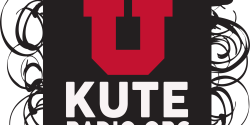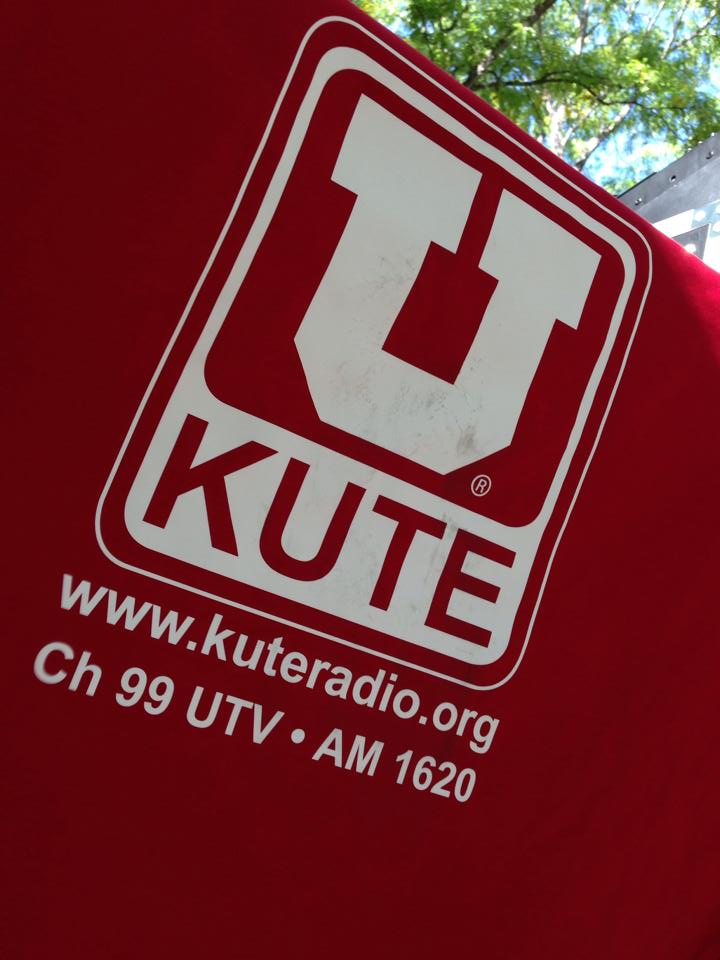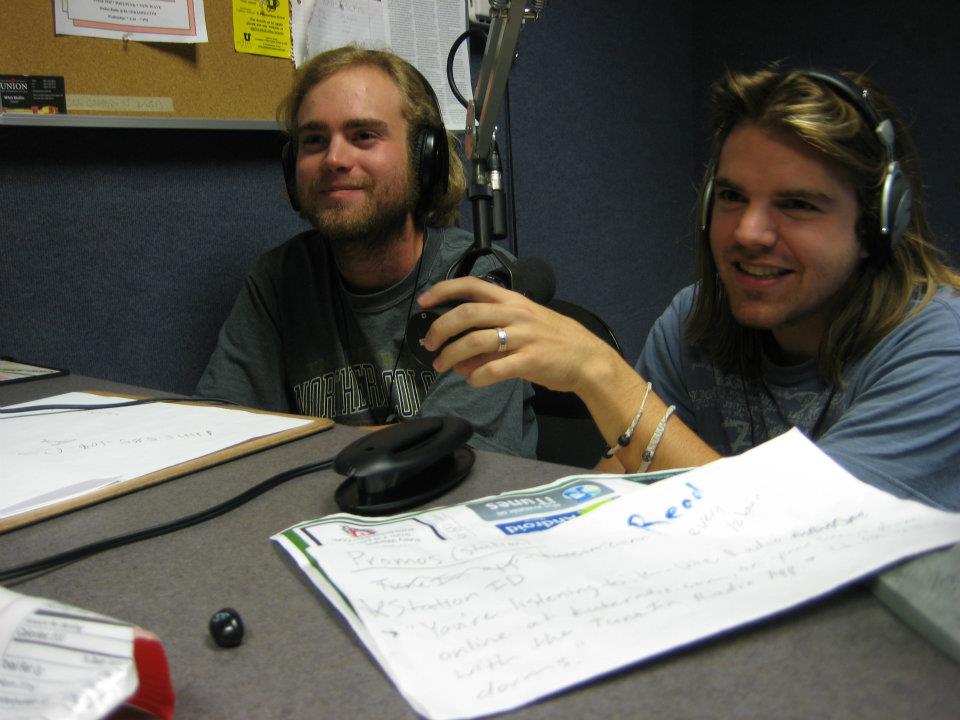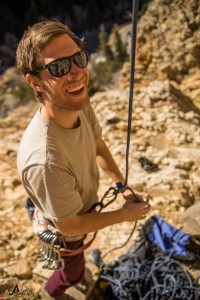When I began my graduate program at the University of Utah I was lucky enough to be the recipient of the Jay W. and Sharlene B. Glasmann Teaching Fellowship. Upon receiving the fellowship my responsibilities were two fold: 1) Teach Comm 1510 Radio Performance and Production and 2) Serve as graduate oversight for the university’s student-run radio station KUTE. My role was as an advisor; all decisions regarding policy and operations were up to students and other members of student media.
I had always been interested in technology and the nature of knowledge/creative work but I struggled to find a specific object of study. After reading some of my seminar papers my advisor told me that I should simply look under my own nose because much of what I was interested in and writing about was happening at KUTE. It was then that I began researching KUTE’s organizational policy, construction of creative workers, and where technology intersected. The following is a very condensed summary of my thesis titled College Radio: Managing the Creative Through Software, A Case Study. Enjoy. – Erik O’Brien
We shape technology and technology shapes us: this is the basic principle of mutual shaping. Marketing and design genies conjure the idea and mission of a piece of technology or software, and a lowly caged programmer types away until he or she can produce the user’s eventual product. Scholars like Mathew Fuller, Nicholas Carr, Shoshana Zuboff, Rob Gehl and many more have written on this topic area for years— spanning a wide range of real world situations where technology and society clash, from Facebook standardization, to mill workers, to search engines, to the smart home technology being forced down your throat by every commercial break on television.
Personally, I spent 2 years researching how the implementation of ENCO’s DAD (Digital Audio Delivery) radio automation software (something some of you may have some experience with) affected KUTE radio, the University of Utah’s now online-line only student radio station. I focused on how the software affected policy and organizational culture at the station. For many, automation may seem like a no-brainer route to a professional and better-educated college radio station, but I will make the case that it would be wise to examine and consider the possible unforeseen consequences before such implementation.
KUTE is a typical college radio station in that its cast and crew is comprised of student radio enthusiasts. There are those who desire to be professional radio broadcasters, but most are students from various disciplines who are looking to have a good time with managing their own music and talk shows. While the KUTE handbook offers the expected sanitized history of the station being a breeding ground for young professionals (which is true); it only takes a brief look at the station’s news article headlines to discover that it oftentimes ran itself like a stereotypical, student-run radio station— a bit edgy, free-spirited, experimental, and the cause of occasional controversy.
A Daily Utah Chronicle article once quoted a 2009 DJ saying “It’s almost a tradition that we get put on probation a few times a year.” While some of the insubordinate exploits of the station, and its subsequent probations, were obviously unacceptable and denounced by the management at my time with KUTE; it is clear that KUTE’s culture was one that would make most think of Cronauer from Good Morning Vietnam, Bull Dog from Frasier, and Madam Psychosis from the fictional WYYY.
Despite condemning the past behavior of DJs at the station, a student manager told me with regard to KUTE’s past, “That’s what gives KUTE its personality.” I won’t bore you with the almost century long history of the organization, but the gist is this: KUTE’s culture is one of free, creative experimentation for entertainers and community activists alike.
In 2013, KUTE, like so many other student run stations, began implementing DAD automation software in an attempt to give students a more professional skill set. The software looks more or less like a confusing version of iTunes built by the design team over at Fischer Price Kids. The software schedules music, ads, liners, auto rotations, and anything else a station wants to have played on a regular basis.
This software allows for stations to run without DJs, though I would argue this takes away the texture and substance from radio with a real person behind the wheel. Basically the software becomes the last gate keeper before the tunes hit your ears rather than it being the DJ. While the use of DAD brings a new skill set for DJs, it imparts the ideology and logic of the software upon the organization. At first DAD was simply used as a way to avoid dead air at KUTE. Eventually, though, management began to make use of its other features, such as scheduling clocks, to prioritize the implementation of ads over the show content of their DJs.
For some, this change was predictable. In his book Reverse Engineering Social Media Rob Gehl makes the case that the standardization of the web has led to its current dependence on advertising. With standardization, we allow for monetization, and now the same is happening with radio.
Due to its recently broken AM transmitter and a lack of funds for repair, KUTE decided to go all online forgoing the traditional FCC regulated community-driven model of most college stations. Though it was hotly debated and there was much disagreement; when management realized that there was an opportunity to insert ads into the software’s programming, new rules were created to guarantee that ads were being played at the top and bottom of every hour.
However, because the staff size was limited, it became a requirement to run all content and music through the DAD software as a means of ensuring that these ads were played. Although the argument can be made that understanding DAD is useful in the professional realm, for KUTE’s purposes, it was met by some unforeseen problems.
First, it required monitoring from management to make sure no one was circumventing the system and playing music via an auxiliary cord. Thus, formerly good DJs became deviants for using manual equipment improvisations. DJs often realized that certain songs and sound bites were needed on the fly which was difficult do when all music had to be uploaded to DAD before the show went on air. A DJ named Alan commented that he now experienced a constant “fear as a DJ,” forever wary that management might catch him breaking the new DAD policies which forbade DJs from using an auxiliary cord and thus on the fly music including students using virtual DJ programs to spin tunes via their own computers.
Further, what was supposed to ensure stability and standardization often led to the opposite with prerecorded shows not being aired and many other unexpected slips. In one example, our version of DAD was not equipped with the proper character package and made it exceedingly difficult for students to play Japanese and Korean music. Though this could be fixed by changing all of the meta data, students could not easily adjust their busy schedules, and what was supposed to be a fun college experience became a stressful chore.
Additionally, the standardization caused an incentive for marketing fixed music and talk formats. No longer could students do any kind of show at a time that was convenient for their class schedules, they had to do hip-hop on Tuesdays, all request at 11am, and talk at 2pm. Therefore, student DJs were being asked to fill predetermined shows at predetermined times rather than craft their own experiences. A running joke started by a staff member named Alexis was that “… our staff shirt this year should say ‘I have DADdy issues’ on the back.”
This is a very condensed summary of the changes that occurred at KUTE during the implementation of DAD automation. The purpose here is not to demonize automation software (specifically ENCO’s DAD) or ignore its helpful capabilities when used correctly. The story of a changing KUTE culture is as much about ads, professionalism, and management as it is about software. The cascading policy and technical changes at KUTE brought on by the implementation of new software serves as an example to others in a similar position.
What I learned during my time at KUTE is that organizations and management need to know where their values lie before implementing such a large change. What is more important to you? Professionalism or experimentation? Fixed shows or DJ autonomy and independence? Surveillance or trust? Your DJs or software and ads? Many of these values are not mutually exclusive but require an aware organization to realize when they come into conflict and how to resolve in a way that supports the organization’s core values. If you are thinking of implementing automation at your station, you should be asking yourself to what degree will we depend on this software and be vigilant of the unforeseen consequences.
Erik O’Brien is the Radio Coordinator for the Utah Arts Alliance. When he is not combing through work email he spends his time in the Wasatch Mountains and working with Youth City, Salt Lake City’s Afterschool Youth Program.






